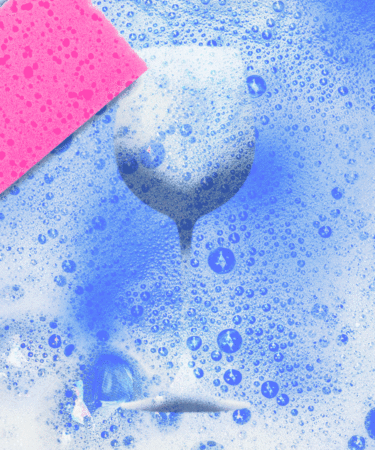Wine glasses are often the most delicate items in the kitchen, which can make washing them a daunting task. One wrong move can be costly and potentially dangerous, not to mention how pesky it can be to replace just one shattered glass in a matching set. Even without any major slip-ups, it can be just as annoying to find your clean glasses cloudy and covered in water spots after spending hours on the drying rack.
Though it might be tempting to grab a more approachable tumbler or even a plastic cup to sip from in an effort to avoid the stress, we’re all about using the proper glassware here at VinePair. So if you have fancy stemware on hand, don’t hesitate to use it — just follow these tips for how to properly clean wine glasses at home.
1. Don’t be afraid of the dishwasher.
It’s a common misconception that wine glasses aren’t machine-washable. But in reality, most stemware fares well in the dishwasher. As long as the glasses aren’t oversized, extremely delicate, or adorned with gold detailing, they should be fine.
This can be a life-changing move for post-dinner party cleanup, but be strategic when loading the machine. First make sure that the glasses aren’t touching anything else, whether it’s plates, pans, knives, or other wine glasses. This will help prevent scratching, as items tend to move during the cycle. If you’re washing a lot of glassware at a time, try dedicating an entire load to those glasses and save the other dishware for another round. And if the glasses fit on the top row of the dishwasher, this is the safest area to place them, as it provides a safer haven for a more delicate wash with less jumbling.
If you’re still wary of the machine, look into some special products developed for this specific purpose. Companies like Wine Wash offer dishwasher clips that are meant to hold the glasses in place, which add an extra layer of security.
2. If hand-washing, use clean, non-scratch sponges.
If your stemware doesn’t fit in the dishwater or you’re looking to just cleanse a single glass, hand-washing is still a good option. Whether you decide to use a cloth, brush, or sponge to soak your stemware is a matter of preference, make sure that whichever you choose is non-scratch. Tough materials adept at scrubbing grime off of gunky pans can be damaging to glass or crystal. If you opt for a sponge, reach for one that you don’t use for daily dish care so food particles and odors aren’t introduced to the glass. It’s best practice to keep a designated, non-scratch sponge or cloth nearby for exclusive use.
3. Avoid using scented soaps.
No, that’s not Gewürztraminer in your glass, it’s just your super-floral soap. While some purists think that wine glasses should be cleaned with just water alone, we believe some suds can be helpful to the cleansing process. Unscented dish soap is best for the job, as it will prevent any unwanted aromas from lingering on the glass. You don’t want your germ-killers messing up your blind-tasting game.
4. Gloves can help you get a grip.
Keep your hands and your stemware safe with a pair of dishwashing gloves instead of relying on your bare hands. Many gloves have a textured grip that can help you hold onto a sudsy, slippery glass and prevent any tumbles and resulting shards.
5. When it comes to drying, timeliness is key.
Sure, hand-drying and air-drying are both effective methods, but air-drying leaves room for those pesky droplet stains to develop. We recommend drying or polishing your glasses with a designated microfiber cloth immediately after cleansing them to beat the streaks.
6. Be gentle.
Always hold the stem of the glass instead of the bowl while hand-drying or polishing, as gripping the larger, more delicate part of the vessel can result in streaks, fingerprints, or breakage. It’s also easy to forget how fragile the bowl can be, so work gently and thoughtfully — even during a banal kitchen task, it’s best to stay aware and safe.
*Image retrieved from Artem Zakharov via stock.adobe.com
